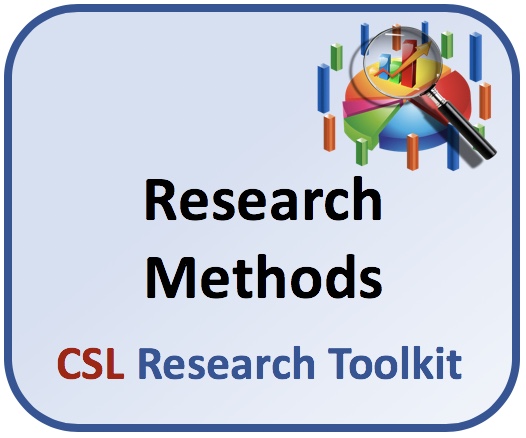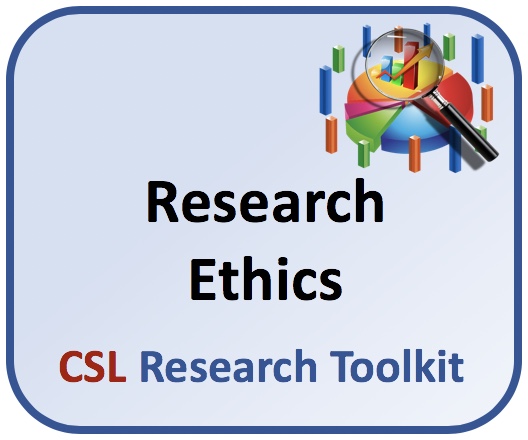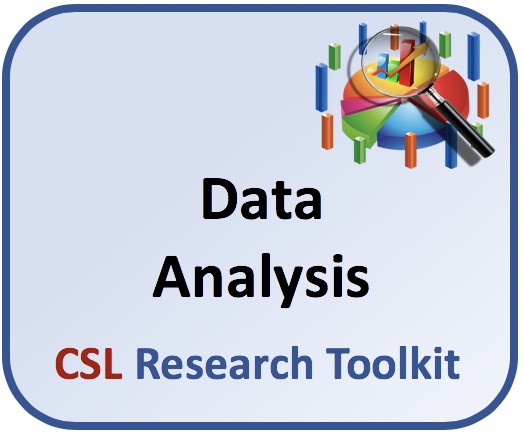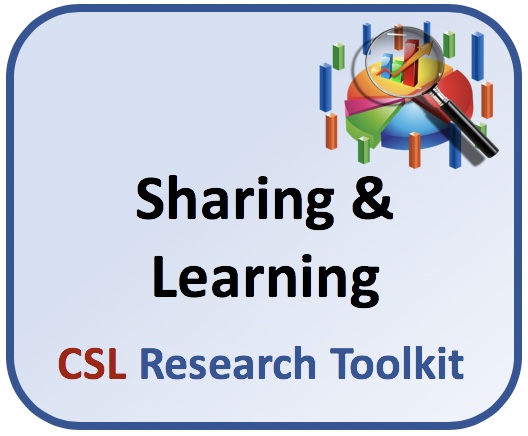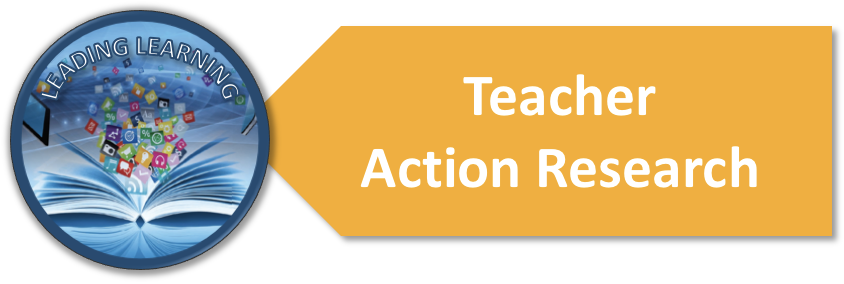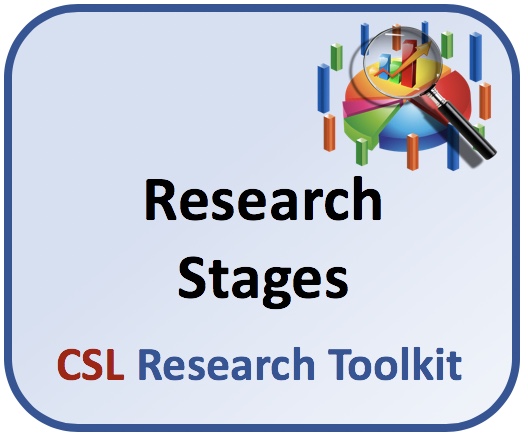
All research, no matter the size or purpose of the study, includes specific stages.
No matter its scale, all research includes the following stages.
- Identifying the problem: The research question
- Literature review
- Establishing methodology
- Collecting and evaluating data
- Organizing, presenting and applying findings
Identifying the Problem: The Research Question
Research typically emerges from a problem or a need to assess an aspect of practice. At the level of an individual school or school district, that might be an assessment of a learning space, an instructional approach, or the success of a particular initiative. For example, a school district may have implemented a one-to-one instructional technology program for all high school students. Considering the risk and the expense that this would involve, it would be judicious to engage in research to assess the success of the initiative. Likewise, an individual school might have renovated the library learning commons space and expanded its virtual library space. It would be very important to assess the success of this initiative. Careful thinking about the problem will inspire the question that the research seeks to answer. The question should be specific enough to generate useful conclusions from the research – conclusions that can inform improvement in practice.
The Literature Review
Once the research question has been established, it is very important to explore what is already know about the issue in question. Indeed the literature review may inspire some modification of the research question, based on increased understanding based on prior research. The review will reveal what is known about a topic and what is not known, and remains to be explored. The literature review will help to strengthen the research question and may provide insight into approaches for your own methodology.
Access to the full range of professional literature may be problematic for many educators in Canada. If your school district does not have a professional library, particularly one that provides access to education and librarianship online subscription databases, you may want to explore other options, including access provided by professional associations.
Establishing Methodology
Once the research question has been refined, a great deal of thought must be put to what method will be used to collect and assess data. A research study may include more than one method, depending on what aspect of the problem is being explored.
The many methods for collecting data can be divided into two categories:
Quantitative Research: Quantitative research uses numerical data or data that can be transformed into statistical information to explore a research question. Quantitative data is particularly useful for formulating facts and uncovering patterns to support research conclusions.
Qualitative Research: Qualitative research encompasses approaches where data is collected through observation of behaviours or verbal interactions or reports. Qualitative research methodology provides deeper insight into the topics being explored. It is important to apply rigour to how this data is collected, organized and analyzed. Qualitative research is used widely in the social sciences and in education.
The Research Methods page of this toolkit provides more information about various ways for collecting data.
Collecting and Evaluating Data
Collecting Data: The most important considerations about collecting data revolve around the amount of time that will be spent on this stage, and the scope. Depending on the research method being used, data collection can be time consuming and take extended resources, like staff time. Another consideration is the scope of the research. It is important to consider how much data will be required and from what sources to provide enough information for the research to be considered valid. The Research Methods page of this toolkit provides information about the many choices you have when selecting the most appropriate way to collect the data you need for your research.
Another consideration when choosing a research method and consequently methods for collecting data is confidentiality and data security. Because research in education and in school libraries in particular involves human interaction, ethical considerations are particularly important. The Research Ethics page of this toolkit offers more information on this topic.
Evaluating Data: Now that you have all of the data, it’s time to uncover the story that the data is trying to tell you. That will require organization and systematic evaluation. The first stage of this may require some efforts to clean up the data – determine missing elements or errors that may have occurred in the data collection process and clean them up, so that they do not contaminate your results.
While analyzing the results of quantitative research may be reasonably straightforward, qualitative research is another matter. Tempting as it may be, reporting on impressions from the stories shared in interviews and focus groups, for example, demonstrates lack of rigour in data analysis. Your conclusions are susceptible to your own bias of interpretation, and may, even should be challenged for reliability. The Data Analysis page of this toolkit provides information on methods translating qualitative data into reliable information upon which to base your research findings.
Organizing, Presenting and Applying Findings
The written report is the standard way of organizing and presenting the findings of your research. Components of the report relate to each stage of the research process, and include other components to provide clarity, like the executive summary and suggestions for further study. The report includes a discussion of the findings and their implications. The Sharing and Learning page of this toolkit provides a more detailed outline of the written report.
Technology offers many opportunities to transform a written report into an attractive and powerful representation of your research findings. Features such as hyperlinking may enhance the user experience and make your research more accessible. Another consideration is the use of data visualization techniques. Moving beyond traditional bar and line graphs into new visualization techniques provide you, the researcher and your audience ways to drill down more deeply into the data for greater insight. The Sharing and Learning page of this toolkit provides ideas for using technology for sharing your findings.
The Action Research Process
As with all research, action research typically emerges from a problem in practice. That could be anything from the perception that an existing approach needs improvement, implementing a new guideline, curriculum or instructional strategy, trying out a new service, or making significant changes to the physical or virtual environment of the learning space. Typically this problem has created some uncertainty, and reveals the need to change practice.
This is the main difference between action research and other research models. As findings emerge they may be implemented as part of the research. The action research process integrates professional learning with research into practice, and adjusting practice along the way is part of the process. The goal is always to improve the student experience and opportunities for success throughout the experience, which may require some adjustments in approach.
Action research continually alternates between inquiry and practice. While the overall stages parallel those presented above, the process is more iterative. Stages may be revisited and approaches adjusted as required. The process can also be described as being cyclical and part of a process for continuous improvement.
The Elementary Teachers Federation of Ontario (ETFO) in its publication Learning Through Teacher Research: A Guide for Your Action Research Journey (Flynn et al, 2016) describes the phases of action research as the “Five Ps”.
- Ponder the problem and pose the inquiry question.
- Peruse the research and plan the action.
- Pursue the plan and collect the data.
- Probe, analyze and iterpret the data.
- Pause, reflect and share your findings.
The authors emphasize that the Five Ps may overlap and are not necessarily sequential. “Repetition and backtracking are normal. It is perfectly appropriate to revisit stages as your learning progresses.”
Leading Learning: Standards of Practice for School Library Learning Commons in Canada provides a useful framework for action research. Visit the Teacher Action Research page of the Leading Learning website for more information on how to use these national standards as an action research framework.
Recommended: The Ontario Ministry of Education provides an excellent and concise guide to collaborative teacher inquiry ( 2010).
The Importance of Sharing What You Have Learned
Part of the reason for the creation of this toolkit is the perception of lack of research into school library practice in Canada. It is possible, however, that more research exists but that it has not been shared. A school or school district may have conducted research and used their findings to inform their own practice, but they may not have shared it with the wider education community. We have lost that learning opportunity. Academic research may have been done and the results published in an academic journal, but without access to subscription research databases, many practitioners may not benefit from the findings of that research.
In the academic community, there is a drive for more open access to research, and efforts to make this a reality are often spearheaded by academic libraries. Canadian School Libraries is dedicated to fostering and openly sharing research into school library practice through the Treasure Mountain Canada Research Symposium and Think Tank initiative, the CSL Journal and the CSL Research Archive. The Sharing and Learning page of this toolkit provides more information on these opportunities to share your research so that everyone can benefit.
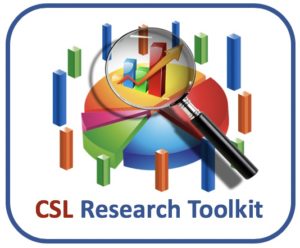 | 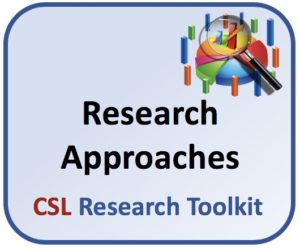 | 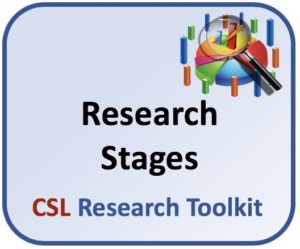 | 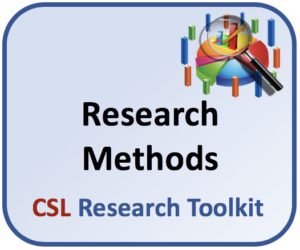 | 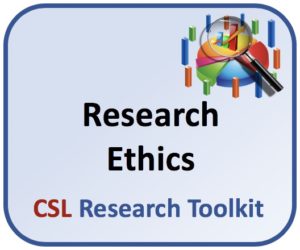 |
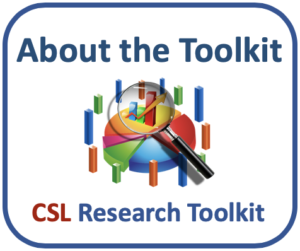 | 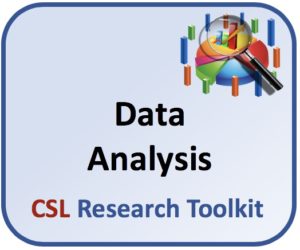 | 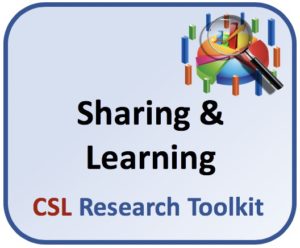 | 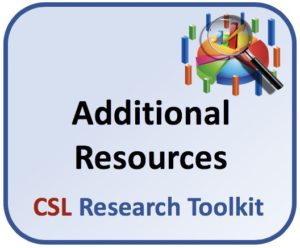 | 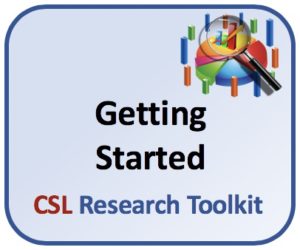 |

